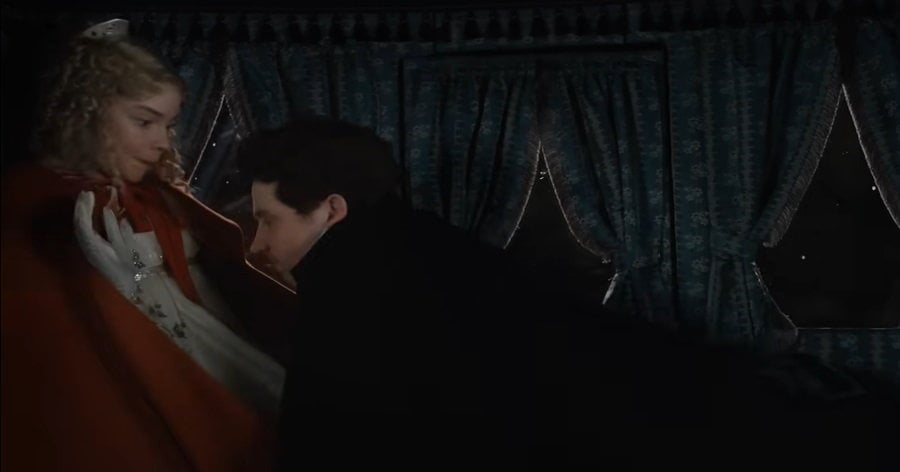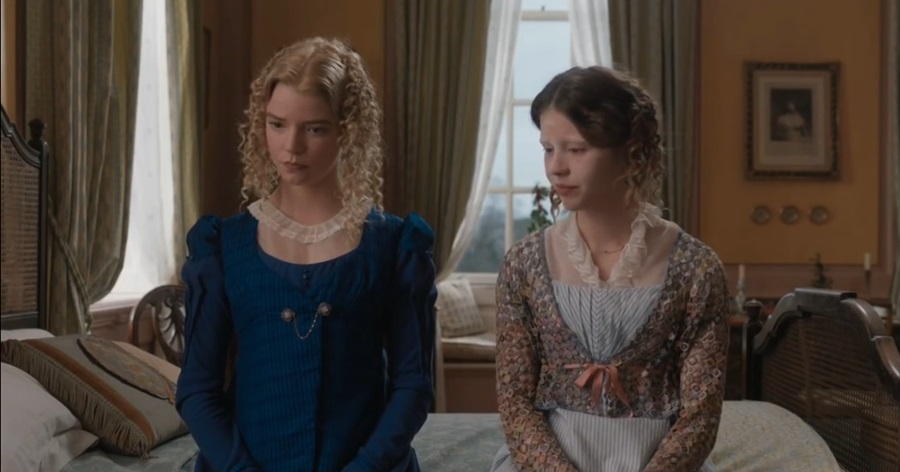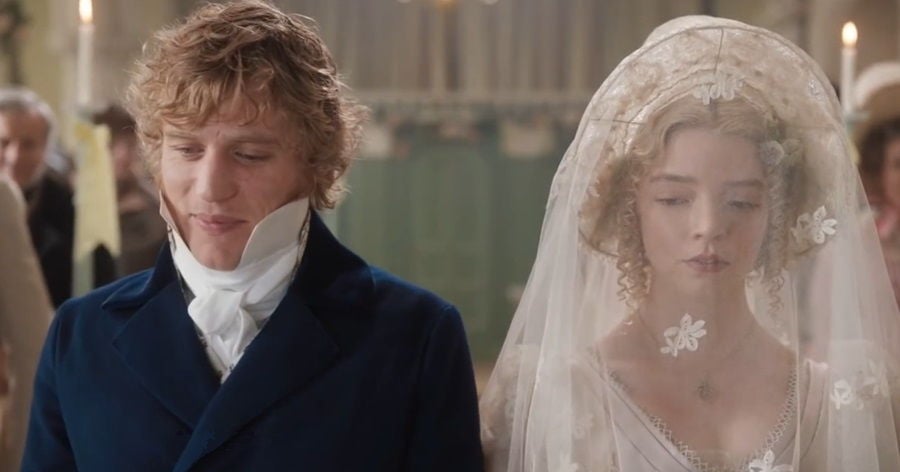Directed by Autumn de Wilde, Emma is a vibrant and witty retelling of Jane Austen’s beloved novel of the same name. The film captures the essence of Regency-era England, weaving together humour, romance, and social commentary into a beautifully crafted narrative. Starring Anya Taylor-Joy as the titular character, the movie delivers a fresh take on the classic story of matchmaking, misunderstandings, and self-discovery.
The story follows Emma Woodhouse (Anya Taylor-Joy), a wealthy, charming, and clever young woman living in the English countryside. Emma fancies herself a skilled matchmaker, although her own romantic life is notably untouched by her efforts. Confident in her social abilities, Emma often meddles in the love lives of those around her, believing she knows what is best for them.
At the start of the film, Emma successfully arranges the marriage of her close friend Miss Taylor (Gemma Whelan) to the wealthy Mr. Weston (Rupert Graves). Buoyed by her success, she sets her sights on finding a suitable match for her new friend, the sweet but socially lower Harriet Smith (Mia Goth). Emma is determined to match Harriet with Mr. Elton (Josh O'Connor), the local vicar, despite Harriet’s budding affection for a local farmer, Robert Martin (Connor Swindells).
Meanwhile, Emma's long-time family friend, George Knightley (Johnny Flynn), observes her interference with growing disapproval, warning her of the dangers of meddling in others' affairs. As the story unfolds, Emma’s matchmaking schemes begin to unravel, leading to a series of misunderstandings, confessions, and revelations that force her to confront her own feelings and faults.
Plot Breakdown: Emma's Matchmaking Missteps
Emma's initial attempt to match Harriet and Mr. Elton is met with disaster when Mr. Elton reveals his affections for Emma, not Harriet. Stunned and embarrassed by this revelation, Emma realizes that she has misread the situation entirely. Mr. Elton, frustrated by Emma’s rejection, quickly marries the wealthy but shallow Augusta Elton (Tanya Reynolds), leaving Harriet heartbroken.

As Emma tries to console Harriet, she becomes distracted by the arrival of the charming Frank Churchill (Callum Turner), Mr. Weston’s son. Emma believes that Frank might be a potential match for her, though she remains unsure of her own feelings. Frank's flirtations with Emma are playful but ultimately misleading, as it is revealed that he has been secretly engaged to Jane Fairfax (Amber Anderson), a quiet and reserved young woman, all along.

Harriet, on the other hand, grows increasingly fond of Mr. Knightley, much to Emma’s surprise and dismay. It is in this moment that Emma realizes she has been blind to her own feelings for Knightley, leading to a pivotal moment of self-awareness. The narrative reaches its emotional climax when Knightley confesses his love for Emma, and she, in turn, realizes that she has loved him all along.
Emma Ending Explained: A Journey of Self-Discovery and Love
The ending of Emma is a satisfying resolution to Emma’s journey of self-awareness and growth. After Knightley declares his love for her, Emma is overwhelmed with joy but is also struck by a sense of guilt over how she has treated Harriet. Emma had unwittingly encouraged Harriet to believe that she had a chance with Knightley, when in reality; Emma herself had long been the object of Knightley’s affections.
Emma's realization of her feelings for Knightley is a crucial turning point in the story. Up until this moment, she has been more focused on controlling the romantic lives of others than on examining her own emotions. Her acknowledgment of her love for Knightley marks the beginning of her emotional maturation, as she finally understands that love cannot be orchestrated or manipulated.

The film ends with Emma and Knightley's engagement, a union that not only brings them both happiness but also symbolizes Emma's growth. She has moved beyond her youthful arrogance and meddling ways to become a more self-aware and compassionate person. The film also wraps up Harriet's storyline, with Harriet reuniting with Robert Martin and finding her own happiness outside of Emma’s influence.
What the Ending Means for Emma
The ending of Emma reflects the overall themes of personal growth and self-realization. Emma begins the story as a character that is confident in her abilities to manage the lives of those around her, but she is often blind to her own flaws. Through a series of humbling experiences, Emma learns that her meddling has caused harm, not only to her friends but also to herself.
Her love for Knightley, which she initially overlooks, is a metaphor for the deeper emotional truths she must confront. Knightley, throughout the film, represents a moral compass for Emma, often gently chastising her when she strays too far into vanity or manipulation. His love for her is steady and unwavering, contrasting with the fleeting infatuations that Emma tries to engineer.
Emma’s union with Knightley is not just a romantic resolution, but also an affirmation of her growth as a person. She has learned to listen, to reflect on her actions, and to accept love on its own terms, rather than trying to control it. The ending, therefore, serves as a fitting conclusion to Emma’s journey toward maturity and emotional depth.
How Emma Was Inspired by Jane Austen’s Novel
The 2020 adaptation of Emma stays remarkably true to Jane Austen’s original novel, written in 1815. Both the film and the novel explore themes of social status, romance, and the limitations placed on women in Regency-era England. Director Autumn de Wilde and screenwriter Eleanor Catton have preserved much of the witty dialogue and sharp social commentary that made Austen’s novel so beloved.
However, the film does take a few liberties with its visual style and tone. Unlike some previous adaptations, Emma leans into the more comedic and absurd elements of the story, with exaggerated costumes and whimsical set designs that give the film a distinctively playful feel. The use of vibrant colours and carefully composed shots brings a modern sensibility to the period piece, making it both a faithful adaptation and a fresh take on Austen's work.
Viewers' Reaction to the Ending
The ending of Emma was largely well-received by audiences and critics alike, with many praising the film for staying true to the spirit of Austen's novel while also offering a visually stunning and witty adaptation. Fans of Austen appreciated the faithful rendering of the characters, particularly Emma and Knightley, whose chemistry and emotional journey remained at the heart of the story.
Some viewers were particularly moved by the final scenes, where Emma finally realizes her feelings for Knightley and takes responsibility for her past actions. The film’s exploration of Emma’s personal growth resonated with audiences, who appreciated the character’s development from a well-meaning but misguided matchmaker to a woman capable of deep introspection and genuine love.
The light-hearted yet poignant conclusion, which sees both Emma and Harriet find happiness in their respective romantic relationships, was seen as a satisfying and heart warming resolution. However, some viewers found the film’s pacing to be slow in parts, and a few critics noted that the film’s focus on style occasionally overshadowed the emotional depth of the story. Nevertheless, Emma was widely regarded as a charming and faithful adaptation of Austen’s classic novel.
Conclusion of Emma: A Journey To Self-Awareness
Emma is a delightful and visually captivating adaptation of Jane Austen’s novel, blending humour, romance, and social commentary in a way that feels both timeless and contemporary. At its core, Emma is a story about self-discovery, love, and the dangers of pride and presumption. Through her journey, Emma learns the value of humility and introspection, realizing that true love cannot be orchestrated or controlled. Her relationship with Knightley is the heart of the film, representing the emotional growth that comes from understanding oneself and others.
The film’s ending serves as a satisfying resolution to Emma’s character arc, showing her personal transformation and her newfound capacity for love and compassion. With its witty script, stunning visuals, and strong performances, Emma stands as a worthy adaptation, offering both a faithful retelling and a fresh perspective on the timeless themes of love, friendship, and self-awareness.






